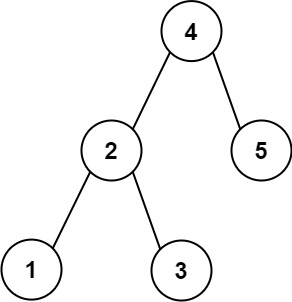Given the root of a binary search tree, a target value, and an integer k, return the k values in the BST that are closest to the target. You may return the answer in any order.
You are guaranteed to have only one unique set of k values in the BST that are closest to the target.
Example 1:
Input: root = [4,2,5,1,3], target = 3.714286, k = 2 Output: [4,3]
Example 2:
Input: root = [1], target = 0.000000, k = 1 Output: [1]
Constraints:
- The number of nodes in the tree is
n. 1 <= k <= n <= 104.0 <= Node.val <= 109-109 <= target <= 109
Follow up: Assume that the BST is balanced. Could you solve it in less than O(n) runtime (where n = total nodes)?
Companies: LinkedIn, Google, Amazon
Related Topics:
Two Pointers, Stack, Tree, Depth-First Search, Binary Search Tree, Heap (Priority Queue), Binary Tree
Similar Questions:
- Binary Tree Inorder Traversal (Easy)
- Closest Binary Search Tree Value (Easy)
- Closest Nodes Queries in a Binary Search Tree (Medium)
// OJ: https://leetcode.com/problems/closest-binary-search-tree-value-ii
// Author: github.com/lzl124631x
// Time: O(NlogK)
// Space: O(H + K)
class Solution {
public:
vector<int> closestKValues(TreeNode* root, double target, int k) {
typedef pair<double, int> Node;
auto cmp = [&](auto &a, auto &b) { return a.first < b.first; };
priority_queue<Node, vector<Node>, decltype(cmp)> pq(cmp);
function<void(TreeNode*)> dfs = [&](TreeNode *node) {
if (!node) return;
double d = abs(target - node->val);
pq.emplace(d, node->val);
if (pq.size() > k) pq.pop();
dfs(node->left);
dfs(node->right);
};
dfs(root);
vector<int> ans;
while (pq.size()) {
ans.push_back(pq.top().second);
pq.pop();
}
return ans;
}
};